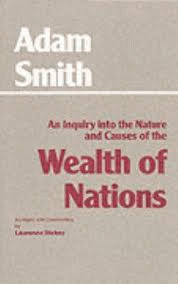Book Review
The Wealth of Nations
by Adam Smith
Abridged Version by Laurence Dickey, Professor of History, University of Wisconsin-Madison (Hackett Publishing 1993)
The Wealth of Nations consists of five books (written between 1767-1777, with the publication of the third and final edition in 1784). Neoliberals and neoconversatives frequent Smith's major work to justify ending government regulation of corporations. They argue that regulation negatively impacts the totally unobstructed free market Adam Smith allegedly advocates.
I think it's high time for liberals, progressives and left libertarians to reclaim Adam Smith as one of our own. Smith self-identifies as a liberal -- one of the first in Europe. He also makes frequent positive reference to what he calls "progressive" economics and "doux-commerce," which calls on government intervention to ensure that rich people invest their profits in increasing productive labor, rather than luxury, corruption and vice.
The 1993 Edition
Smith's writing tends to be somewhat repetitive, as large sections of the later books predate the earlier ones. In his abridged version, Dickey merely summarizes material Smith has introduced in earlier sections. There is also a generous preface, as well as appendices, that position Smith among the various writers of the 18th century Scottish Enlightenment. In this way Dickey shows that, to a large extent, the Wealth of Nations is a consolidation of widely held contemporaneous views on economics.
The overall intent of the Wealth of Nations is 1) to make general observations about the economic and social changes that underlay the transformation from feudalism to modern industrial society and 2) to lay out fundamental macroeconomic principles based on these observations that Smith believes are essential for a prosperous, political stable nation capable of providing an adequate standard of living for its workforce. The latter is extremely important to Smith, both as a principle of social justice and to prevent social unrest.
Smith definitely does not, as claimed by many neocons and neoliberals argue for the need or even desirability of a totally unregulated free market economy. Quite the contrary, Book V "Revenue of the Sovereign or Commonwealth" makes a strong argument that government intervention is essential in free markets to ensure economic growth and general prosperity.
Book I ("Of the Causes of Improvement in the Productive Powers of Labour")
Book I lays out Smith's belief that "division of labor" -- in which individuals stopped making their own plows, dwellings, shoes, clothes, etc. and organized into specialized trades to provide these services -- was the revolutionary socio-economic change that made modern economic development and western-style democracy possible. Smith describes in detail the early development of trade (in nations with access to the sea and inland waterways) and the origin of money. He also explains how supply and demand work, showing how higher demand leads to higher prices, which leads producers to bring more of their product to market, which, in turn, tends to lower prices. He argues that an under supply of labor leads to increased wages and an oversupply a decrease in population growth.
Smith provides considerable detail from merchant and export records regarding 18th century wages in England, Scotland, France, and North America, as well as the average price of common commodities. Citing the American colonies as an example, he concludes that the wages and welfare of workers is always worse in an established static economy than in one that is growing, i.e. where new land is being put into production and new industries being formed.
He makes a detailed case for slavery being uneconomical. He argues that paying workers directly for their work makes them more productive and results in more capital that can be reinvested in productive labor.
Smith's Advocacy for Social Justice
(Note: You can view every article as one long page if you sign up as an Advocate Member, or higher).






